How Crimean predators ravaged Rus' and tried to revive the Golden Horde
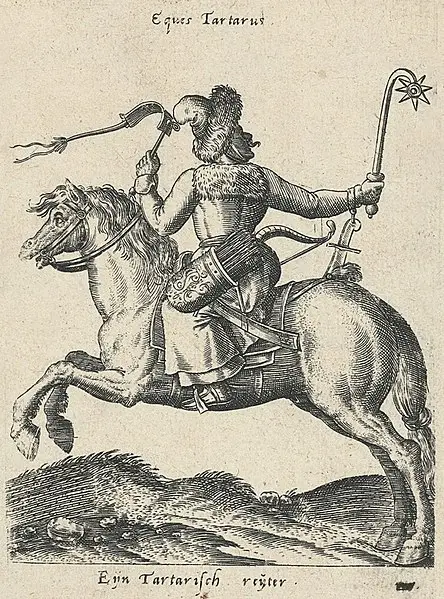
Crimean Tatar horseman in an engraving by the Flemish engraver Abraham de Bruin
Crimean predators
The Russian state, led by Emperor Vasily III, led the Ten Years' War with Lithuanian Rus to victory, intending to take not only Smolensk (Three sieges of Smolensk), but Vitebsk, Polotsk and Kyiv. However, the war had to be waged not only on the western front, but also on the southern, against the Crimea.
The Crimean Khan Mengli-Girey (was the Crimean Tsar several times, first took the throne in 1467, reigned until 1515), who for a long time was an ally of the great sovereign of Moscow Ivan III Vasilyevich, grew old, was ill and lost the threads of rule. His sons fought for power, needed money, and Lithuanian diplomats gave it, promising an annual tribute of 15 thousand zlotys if the Crimeans attacked the Russian kingdom.
On the other hand, slave traders acquired great power in Crimea. The Ottomans and Tatars in the Sublime Porte themselves were almost not involved in the slave trade; for a warrior this trade was considered shameful. People (yasyr, from the Turkish esir - “prisoner of war, captive”) were caught and handed over to traders. And since ancient times, Arabs, Greeks, Jews and Armenians have been merchants.
In Crimea, since the times of the Khazaria, this black trade has been monopolized by the Jewish community. She was connected with other Jewish communities in the Ottoman Empire, Central Asia, Persia, the Mediterranean countries and Western Europe. The slave trade has long been one of the most profitable “businesses”, along with the drug trade. Therefore, slave traders encouraged attacks by Crimean troops on Lithuanian, Muscovite Rus', and Poland. White Slavic slaves and children were always at a premium.
Perekop has become the largest wholesale market. Here merchants bought yasir-full from warriors. In the Cafe, “living goods” were resold and transported to different destinations. The Crimean Khanate itself has changed a lot. Previously, the basis of the economy was production - cattle breeding, farming and gardening. Now the economy has become almost entirely parasitic, appropriating. During large campaigns, almost all men went for yasir. A narrow specialization of the Crimean Khanate developed. Without this, the Crimeans could no longer exist. Everyone depended on the money of slave traders - princes, princes, viziers, murzas, courtiers and warriors.
In Lithuanian Rus, the Ukrainian outskirts of Poland, due to large-scale invasions and raids, which the lords were unable to counter with a developed border line of defense (batches, guard fortresses, Cossacks), the border areas literally became a human desert. Rich, fertile lands turned into a Wild Field. There was noticeably less prey, so the Crimean predators decided to switch to Muscovite Rus'. Here the interests of the Polish king and the Grand Duke of Lithuania Sigismund, slave traders and Crimean princes coincided.
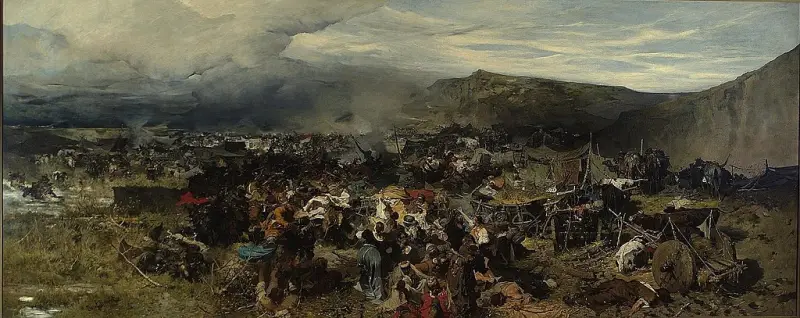
Jozef Brandt. "Recapturing the Yasyr"
Threat from the South
Already during the life of Mengli-Girey, the corrals of the Crimean princes began to disturb the Ryazan, Seversky, Chernigov and Tula lands. In 1507, the kalga (heir to the throne) Mehmed-Girey, the eldest son and co-ruler of Mengli-Girey, led a raid on Moscow lands. The Crimean Tatars invaded the southern Russian lands and ravaged the surroundings of Kozelsk and Belev. Russian governors repelled the Tatars from the banks of the river. Oki and recaptured the captured full.
In May 1512, the sons of the Crimean king Akhmed-Girey and Burnash-Girey attacked the southern Russian lands, where they ravaged the environs of Belev, Odoev, Vorotynsk, Aleksin, taking away many people. Russian regiments pursued the enemy, but the Tatar princes successfully escaped. In June 1512, Tsarevich Akhmed-Girey launched a new raid on the Moscow outskirts of Ukraine. The Crimeans broke into the Seversk land, where they ravaged the outskirts of Putivl, Starodub and Bryansk.
In July 1512, Kalga Mehmed made his third campaign against the southern Russian lands and invaded the Ryazan region. The Crimeans managed to devastate only the outskirts of the Ryazan land. The Moscow governors, pursuing the enemy, followed the Tatars across the Don to Tikhaya Sosna, but were unable to catch up with the enemy. In October of the same 1512, the fourth raid on Russian lands took place. On October 6, Tsarevich Burnash-Girey and his army suddenly approached Ryazan. The Crimean Tatars captured the fort and ravaged the Ryazan settlement. However, the Russian garrison repelled all enemy attacks. Three days later, the Tatars with a large number of troops left for the steppe.
In June 1513, the Crimeans devastated the environs of Bryansk, Putivl and Starodub. In the fall of 1513, Kalga Mehmed, at the head of a large Tatar horde, launched a raid on the Seversk land. Auxiliary detachments of Lithuanian governors took part in the campaign. The Seversky appanage princes, with the support of the Moscow governors, repelled the enemy invasion. In March 1515, Kalga Mehmed-Girey carried out a new campaign against the southern Russian possessions. The Crimean Horde invaded Severshchina, where the Tatars, together with the Lithuanian governors, unsuccessfully besieged the cities of Chernigov, Novgorod-Seversky and Starodub, capturing a large number of prisoners.
In April 1515, the old Crimean Khan Mengli-Girey died. The throne was taken by Mehmed-Girey. He behaved impudently and arrogantly. He announced that Crimea is the heir to the Golden Horde. He tried to unite the former uluses of the Horde and turn Lithuanian and Muscovite Rus' into tributaries. During this period, during the Kazakh invasion, the Nogai Horde was defeated. Many Nogai princes recognized their dependence on the Crimean king and moved with their people to the western bank of the Volga. Later, the Nogais returned to their ulus, but for some time they were subordinate to the Crimean Horde.
His younger brother Akhmed-Girey, who relied on his ulus centered in Ochakov, rebelled against Mengli. Akhmet tried to establish connections with Moscow and Istanbul. But in the end, the older brother defeated the rebel. Ahmed was killed.
Mehmed-Girey demanded that Tsar Vasily Ivanovich pay tribute and return to Lithuania not only Smolensk, but also Bryansk, Starodub, Novgorod-Seversky. Putivl. Crimean troops trampled the southern Russian lands almost every year. The Nogai Horde and Lithuanians joined the Crimeans. Evstafiy Dashkovich also acted with them, uniting detachments of free Cossacks.
Russian governors repelled most of these raids. The intelligence was good. The border cities were strong; the Crimeans did not know how to storm fortresses. Moscow governors quickly assembled regiments and drove out the enemy. It happened that they dispersed enemy hordes that did not want to engage in a proper battle, and rescued prisoners.
The alliance with Crimea often backfired on Lithuania itself. If in Muscovite Rus' they did not take yasyr, or they took little, then the Tatars went to neighboring Lithuanian Rus'. They robbed and burned villages and took people away. At the same time, they also took money for the march to Moscow.
However, it was difficult for Moscow to fight on two fronts. Large forces had to be sent every year to cover the southern borders. This did not allow us to concentrate on the Lithuanian front and achieve decisive success.
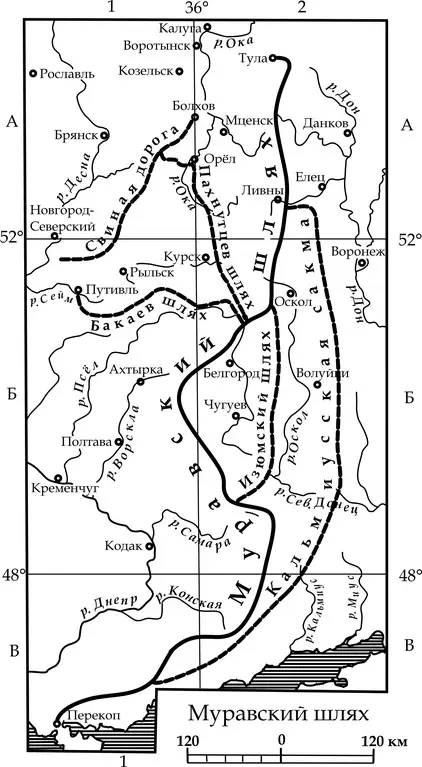
The main routes for transporting yasyr (full) from Southern Rus'.
Diplomacy during the Ten Years' War
At that time, the Russian kingdom had good relations with the Ottoman Empire; there was nothing to divide yet. Therefore, the Russians repeatedly complained to Constantinople about the Crimeans. Sultans Selim and Suleiman, who replaced him, sent orders to Bakhchisarai to stop the raids. But there was no point. The Crimean Tsar blamed everything on the willfulness of the princes and Murzas. And it was beneficial for him to fight with Moscow. In addition, in fact, he could no longer simply change the essence of the predatory Crimean kingdom. One day, in a reply to the Sultan, he simply admitted this:
Other powers began to intervene in the protracted war. The Lithuanians were helped by Poland, Czech and Hungarian relatives of King Sigismund. Russia was also looking for allies to create a second front for Poland. Moscow tried to conclude an alliance with Denmark.
At this time, Sweden left the Kalmar Union with Denmark. Kalmar Union 1397–1523 - the unification of Denmark, Norway (with Iceland) and Sweden (with Finland) in a personal union under the supreme authority of the Danish kings. The Danish king Christian II tried to bring Sweden back under his control. The Russian kingdom and Denmark entered into an alliance against Sweden. But Christian was overthrown by his own subjects, and he fled to Germany.
Another ally of Moscow was the Teutonic Order. The knights wanted to throw off vassalage from Poland. Master Albrecht of Brandenburg turned to Muscovite Rus'. In February 1517, the first envoy of the order, Dietrich Schonberg, arrived in Moscow and conducted active negotiations with representatives of the great sovereign. They culminated in the conclusion of the first international treaty between Russia and the Teutonic Order. The treaty of union was signed on March 10, 1517. Moscow's envoys repeatedly appeared on the lands of the order, helped the knights financially, and gave money to recruit mercenaries.
In December 1519, the war between the Teutonic Order and Poland began. However, it quickly became clear that the knights had already lost their former combat potential. In 1521 a truce was signed. In 1525, the Peace of Krakow was signed, according to which most of the Teutonic Order was secularized and declared a vassal Duchy of Prussia to Poland. Grand Master Albrecht of Brandenburg-Ansbach became the first Duke of Prussia. The Teutonic Order, which elected a new master, continued to exist, but no longer played any significant role.
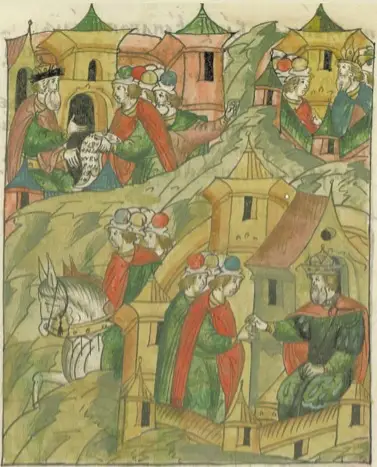
Albrecht of Brandenburg-Ansbach exchanges diplomats with Basil III. Facial chronicle vault
Moscow is offered Constantinople and the Polish-Lithuanian kingdom
Moscow also remembered the long-standing anti-Polish alliance with the German Emperor Maximilian. An embassy was sent to the Holy Roman Emperor. Maximilan formally agreed with Moscow’s arguments that the Jagiellons had become too strong and dangerous. The emperor agreed to renew the alliance. Diplomat Sigismund von Herberstein was sent to Russia for negotiations.
In fact, Maximilian had no intention of supporting either Russia or Poland. He wanted to use them for war with the powerful Sublime Porte. Herberstein's goal was to persuade Tsar Vasily III to make peace with Lithuania in order to jointly fight the Turks. But the Lithuanians demanded the return of Smolensk, and Herberstein supported them. And Vasily responded with a decisive refusal.
The Roman throne traditionally took the side of Russia's opponents. Pope Leo X of the Medici clan organized magnificent celebrations and illuminations in Rome on the occasion of the victory of the Lithuanian regiments near Orsha. In Western Europe, at the instigation of Lithuania, this victory was inflated in every possible way. Also, Pope Leo tried his best to convince the Teutonic Order not to fight with Poland. However, when it became clear that the Moscow regiments were taking over, the Lithuanians were running out of steam, there was no money for the war, and the gentry were in no hurry to leave their family estates, the Pope and Emperor Maximilian urgently became concerned with peacekeeping. Moscow was called for prudence, convinced to give up Smolensk, and frightened by the Ottoman threat.
To push Moscow into an alliance with Lithuania and a war with Turkey, Pope Leo even promised to recognize the rights of Emperor Basil to Constantinople and promised to crown him a “Christian emperor.” Moscow was also given hints about Lithuanian Rus. They say that Sigismund has no heirs, when he dies, Vasily can nominate himself and receive Lithuania along with Poland. The Pope unequivocally vouched for Vasily Ivanovich's victory. This required a “trifle” - to unite the Russian Church with the Catholic Church.
Moscow did not like this, and they answered unequivocally that in matters of faith they do not need intermediaries.
Thus, the then collective West and its think tank, Rome, once again tried to push through cultural and informational sabotage. Subordinate Russian Orthodoxy to the papal throne. They promised a lot. In essence, Rus' was supposed to become the cultural periphery of Europe. With the gradual loss of its originality, the death of Russian civilization.
In fact, Pope Leo and Maximilian lied. They wanted to deceive Moscow by tempting them with the Polish-Lithuanian crown. In fact, they were hastily looking for a bride for King Sigismund so that he would not be left without an heir. In 1518 they betrothed the Milanese princess Bona Sforza to him. She gave birth to an heir - Sigismund Augustus. It was brought to Poland by the same Baron Herberstein, who was a mediator in the Russian-Lithuanian negotiations. The Sforza family supplied mercenaries throughout Europe and was fabulously rich. Bona brought a large dowry, which allowed Poland to continue the war and take over the Teutonic Order.
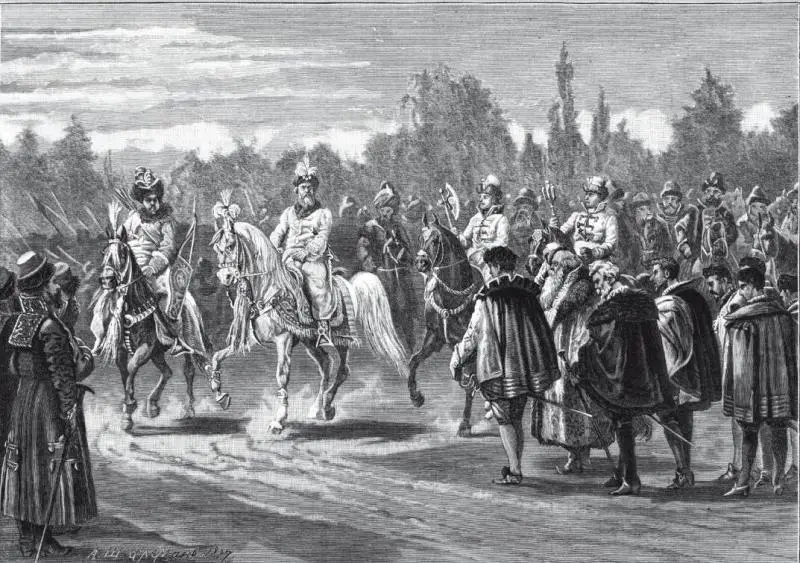
Meeting of Grand Duke Vasily III with the emperor's ambassadors near Mozhaisk (19th century engraving). A. I. Charlemagne
Invasion of the Crimean-Kazan horde
Meanwhile, the situation on the southeastern borders worsened. In December 1518, the childless Kazan Khan Muhammad-Amin, a protege of Moscow, died. In the spring of 1519, the great sovereign Vasily III placed his protege, Kasimov's prince Shah-Ali, on the khan's throne in Kazan.
The Kazan Murzas, opponents of the pro-Russian party, organized a conspiracy against Shah Ali. They asked the Crimean king to send his brother to Kazan. He sent his brother with a detachment. In the spring of 1521, Shah Ali was overthrown and fled to Russia. Sahib-Girey was elevated to the Kazan throne.
Immediately, before Moscow came to its senses, the Crimean and Kazan hordes invaded Russian lands. The Nogais, Lithuanian troops, and Dashkovich’s Cossacks, who were sent by the Polish king, also took part. The Grand Duke hastily assembled an army, entrusting command to his brother Andrei Staritsky and Dmitry Belsky. But they commanded very poorly, the regiments were positioned poorly and were the first to flee when the enemy attacked. The Russian regiments were defeated, settled in fortresses, the Crimeans and Kazan people united near Kolomna and marched on Moscow. The pogrom in Rus' was terrible (Crimean tornado. How the Crimean and Kazan hordes destroyed Moscow Russia).
Tsar Vasily left for Volokolamsk to gather a new army. The regiments were recalled from the Lithuanian front. The steppe inhabitants besieged Moscow, the khans stopped in the royal village of Vorobyovo, admiring the city of Moscow from the heights. Those who approached the fortress were repulsed by artillery. But the city was not ready for a siege; there was little gunpowder and food.
The boyars sent a delegation with gifts from the gods to the Crimean king. The Tatars also could not besiege the city. This could lead to large losses, lack of time and room for maneuver. And at this time the Russian sovereign could approach with an army. So Mehmed took the gifts and led the horde away. He was also given a letter stating that Vasily recognizes himself as a tributary of Crimea.
On the way back, the Tatars tried to take Ryazan, but were defeated. During the battle, the Ryazan governor Khabar Simsky captured the royal charter. Meanwhile, the royal regiments rushed to the rescue of Ryazan. The Tatars retreated, but took away a huge full. The price of slaves in the markets fell sharply.
Because of the attacks of Crimea, Moscow had to abandon the idea of a decisive victory over Lithuania (The invasion of the Crimean-Kazan horde saved Lithuania from complete defeat). Negotiations began. The condition of the Grand Duchy of Lithuania was deplorable. It was completely devastated by the war. On September 14, 1522, a truce was concluded in Moscow for five years, according to which the Smolensk lands remained with Russia, but it renounced its claims to Kyiv, Polotsk and Vitebsk.
The collapse of hopes for the revival of the Golden Horde
Meanwhile, Crimea reached the peak of its power. King Mehmed, with the support of the Nogais, captured Astrakhan. He proclaimed his eldest son and kalga Bakhadyr-Girey here as the new khan. The three Tatar kingdoms united and the Nogai Horde was subordinated. It seemed that the Golden Horde was being revived. But the power of the Crimean kingdom turned out to be an illusion.
The Nogai princes, who feared the growth of Mehmed's power and coveted the Astrakhan spoils, formed a conspiracy. The arrogant Crimean Khan disbanded his army and remained in Astrakhan with a small squad. The Crimean Khan and his heir Bakhadyr were lured out of the city by the Nogai Murzas and massacred along with their retinue and guards. Then the Nogais made a surprise attack on the Crimean Horde, defeated and robbed it. Only two of the khan’s sons, Gazy and Baba Giray, were able to escape. The dream of restoring the Golden Horde was buried.
Moscow is establishing order on its eastern borders. When the Kazan Tsar Sahib-Girey learned about the capture of Astrakhan, he ordered the execution of Ambassador Vasily Yuryevich Bushma Podzhogin, who was in his captivity, and Russian merchants, which caused serious discontent in Moscow. In September 1523, a new campaign against Kazan began. The ship's army reached Kazan and, having ravaged the shores and surrounding areas, returned back. The horse army, having reached Sviyaga, defeated a large Kazan detachment. While these troops distracted the attention of the Tatars, the Russians built the Vasil-Gorod (Vasilsursk) fortress at the mouth of the Sura. The fortress became an outpost for a further attack on Kazan.
Sahib-Girey asked for help from Crimea and Turkey, but did not receive it. In the spring of 1524, the Grand Duke of Moscow Vasily III Ivanovich organized a new big campaign against the Kazan Khanate. The Kazan Tsar fled to Crimea. The Kazan people put his nephew Safu-Girey on the table. The Russian army besieged Kazan, but could not take it. After the departure of the Russian troops, the Nogai attacked the Kazan kingdom. Kazan made peace with Moscow. Safa-Girey recognized himself as a vassal of the great sovereign Vasily.
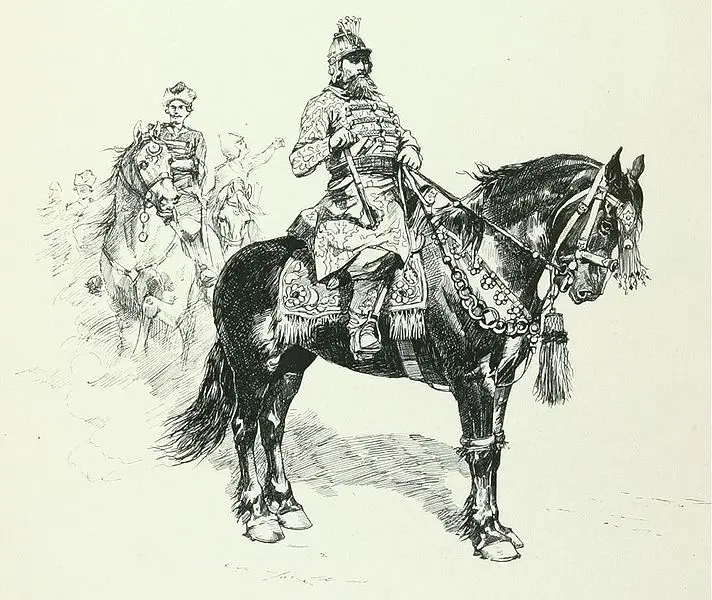
Grand Duke Vasily III Ivanovich. Source: Grand-ducal and royal hunting in Rus', volume 1, 1896
Information